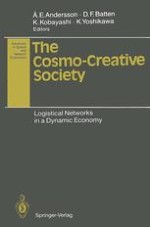1993 | OriginalPaper | Chapter
The Complexity of Economic Decisions — Anticipatory Human Behavior
Author : Wei-Bin Zhang
Published in: The Cosmo-Creative Society
Publisher: Springer Berlin Heidelberg
Included in: Professional Book Archive
Activate our intelligent search to find suitable subject content or patents.
Select sections of text to find matching patents with Artificial Intelligence. powered by
Select sections of text to find additional relevant content using AI-assisted search. powered by
During the past three decades, studies of nonlinear and unstable phenomena in various evolutionary systems have deepened our understanding of dynamic evolution (e.g., Haken, 1977, 1983; Prigogine and Stengers, 1984; Andersson, 1986, 1987; Zhang, 1988, 1989, 1990). Our thinking about evolutionary systems has been changed by the scientific concept of bifurcation. It has become clear that complicated forms of behavior such as chaos are not exceptions but rather universal phenomena in evolutionary systems. Rather than linearity, we have non- linearity; rather than unique equilibrium, we have multiplė equilibria; rather than stability, we have instability; rather than predictability, we have unpredictability; rather than simplicity, we have complexity and chaos. Chaotic phenomena have caused great and even inflated interest among mathematicians, natural scientists and economists. But it is our wish that an understanding of chaotic evolution should not bring chaos into our thinking. The new vision about the evolution of dynamic systems should make it possible for us to systematically recognize the limitations and validity of classical scientific work. We have to organize and re-interpret existing knowledge in order to obtain new insights into the world.
